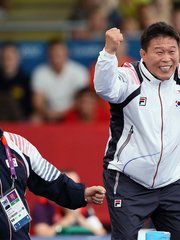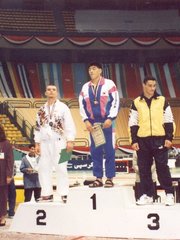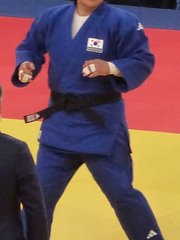

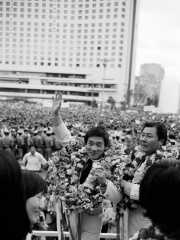


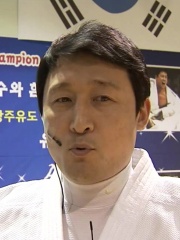

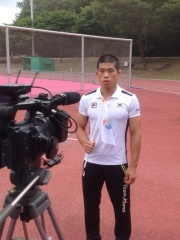
The Most Famous
WRESTLERS from South Korea
This page contains a list of the greatest South Korean Wrestlers. The pantheon dataset contains 1,027 Wrestlers, 29 of which were born in South Korea. This makes South Korea the birth place of the 10th most number of Wrestlers behind Sweden, and Hungary.
Top 10
The following people are considered by Pantheon to be the top 10 most legendary South Korean Wrestlers of all time. This list of famous South Korean Wrestlers is sorted by HPI (Historical Popularity Index), a metric that aggregates information on a biography's online popularity. Visit the rankings page to view the entire list of South Korean Wrestlers.

1. Ahn Byeong-keun (b. 1962)
With an HPI of 51.09, Ahn Byeong-keun is the most famous South Korean Wrestler. His biography has been translated into 20 different languages on wikipedia.
Ahn Byeong-keun (born 23 February 1962 in Daegu) is a retired judoka from South Korea, who represented South Korea at the 1984 Summer Olympics. There he claimed the gold medal in the men's lightweight division (–71 kg) by defeating Italy's Ezio Gamba in the final. Ahn participated at the 1992 Summer Olympics as a coach.

2. Choi Min-ho (b. 1980)
With an HPI of 50.46, Choi Min-ho is the 2nd most famous South Korean Wrestler. His biography has been translated into 25 different languages.
Choi Min-ho (Korean: 최민호; Korean pronunciation: [tɕʰwe̞.min.ɦo]; born 18 August 1980) is a South Korean judoka. He was born in Gimcheon, Gyeongsangbuk-do, South Korea.

3. Yang Jung-mo (b. 1953)
With an HPI of 48.97, Yang Jung-mo is the 3rd most famous South Korean Wrestler. His biography has been translated into 18 different languages.
Yang Jung-Mo (Korean: 양정모; Hanja: 梁正模; born January 22, 1953) is a retired South Korean Olympic freestyle wrestler and the first Olympic champion from South Korea. He was born in Busan, South Korea. He received a gold medal in the featherweight division of wrestling at the 1976 Summer Olympics in Montreal.

4. Lee Kyung-keun (b. 1962)
With an HPI of 48.50, Lee Kyung-keun is the 4th most famous South Korean Wrestler. His biography has been translated into 19 different languages.
Lee Kyung-Keun (born 7 November 1962) is a South Korean retired judoka. Lee was a runner-up in the half-lightweight (65 kg) division at the 1985 World Judo Championships. Three years later, at the 1988 Summer Olympics in Seoul, Lee won an Olympic gold medal in the half-lightweight (65 kg) division.

5. Kim Weon-kee (1962 - 2017)
With an HPI of 48.17, Kim Weon-kee is the 5th most famous South Korean Wrestler. His biography has been translated into 15 different languages.
Kim Weon-Kee (Korean: 김원기; Hanja: 金原基; January 6, 1962 – July 27, 2017) was a South Korean Greco-Roman wrestler and Olympic champion. Kim was born in Hampyeong, South Jeolla Province, South Korea.

6. Lee Won-hee (b. 1981)
With an HPI of 48.09, Lee Won-hee is the 6th most famous South Korean Wrestler. His biography has been translated into 20 different languages.
Lee Won-hee (Korean: 이원희; born 19 July 1981) is a South Korean quadruple judo champion. Lee won the gold medal in the men's lightweight division at the 2004 Summer Olympics in Athens, Greece. He was the world champion in 2003. He also won the gold medal in 2006 Asian Games and 2003 Asian Judo Championships. He won his Olympic gold medal by way of Ippon against Vitaly Makarov of Russia with 9 seconds left. He was leading in the bout anyway, but had secured the win when he went in for Drop Seoi Nage and combined it with Kouchi gari to deliver Makarov onto his back with force. He was voted top judoka in the 2004 Olympics. Lee was renowned for his favourite technique Tai Otoshi. Lee is arguably one of the best South Korean judokas ever to live. During his active career, he was nicknamed "Mr. Ippon" and "Grand Slammer" for his 48-game winning streak, of which, 43 were won by ippon. He lost to Wang Ki-chun in the qualifications for the 2007 World Championships in Rio de Janeiro and 2008 Olympics in Beijing. Lee taught judo at his alma mater Yong In University. In 2015, he was promoted to head coach of the South Korean Women's Judo National Team.

7. Jeon Ki-young (b. 1973)
With an HPI of 47.92, Jeon Ki-young is the 7th most famous South Korean Wrestler. Her biography has been translated into 19 different languages.
Jeon Ki-young (Korean: 전기영, born 11 July 1973 in Cheongju, North Chungcheong Province) is a retired judoka who competed in the –78 kg and –86 kg divisions. Jeon has won three consecutive world championships (1993, 1995 & 1997), twice beating Hidehiko Yoshida in dramatic fashion in the finals. He has also won six world cup titles. The crowning moment in Jeon's judo career came in winning the gold medal in the men's middleweight division at the 1996 Olympics in Atlanta, U.S. He defeated Armen Bagdasarov of Uzbekistan in the final match by ippon. In his march to the gold, Jeon won every match by ippon, except the 1st round match against the Dutch judoka Mark Huizinga, who would go on to dominate the weight once Jeon himself retired. Jeon retired from competition at a relatively young age of 25 in 1999, citing both knee injuries and an absence of motivation due to a lack of competition. He retired undefeated in both Olympic and world championship competition. In 2003, PRIDE FC and Antonio Inoki tried to sign Jeon to fight Yoshida under MMA rules (using the fact that Jeon has never lost against Yoshida in judo) but Jeon refused offers.

8. Cho Min-sun (b. 1972)
With an HPI of 46.07, Cho Min-sun is the 8th most famous South Korean Wrestler. Her biography has been translated into 20 different languages.
Cho Min-sun (born 21 March 1972) is a South Korean judoka. Cho won a gold medal in the middleweight division at the 1996 Summer Olympics and a bronze medal at the 2000 Summer Olympics, and also won two gold medals at the 1993 and 1995 World Championships. Cho also won a bronze medal in the -48 kg division at the 1988 Summer Olympics in Seoul, where women's judo was held as a demonstration sport. Cho is the only South Korean judoka to win national championships in five different judo divisions: from 48 to 66 kg. She is currently a full professor at Korea National Sport University in Seoul.

9. Jung Ji-hyun (b. 1983)
With an HPI of 45.57, Jung Ji-hyun is the 9th most famous South Korean Wrestler. His biography has been translated into 17 different languages.
Jung Ji-hyun (Korean: 정지현; born March 26, 1983) is a South Korean former wrestler who won a gold medal at the 2004 Summer Olympics in Greco-Roman wrestling. Jung was born in Seoul, South Korea.

10. Jang Sung-ho (b. 1978)
With an HPI of 45.27, Jang Sung-ho is the 10th most famous South Korean Wrestler. His biography has been translated into 16 different languages.
Jang Sung-ho (born 12 January 1978) is a male South Korean judoka who won a silver medal at the 2004 Summer Olympics in Athens. He also won a gold medal at the –100 kg category of the 2006 Asian Games. Jang was a flag bearer at the 2008 Summer Olympics in Beijing.
People
Pantheon has 29 people classified as South Korean wrestlers born between 1953 and 2000. Of these 29, 27 (93.10%) of them are still alive today. The most famous living South Korean wrestlers include Ahn Byeong-keun, Choi Min-ho, and Yang Jung-mo. The most famous deceased South Korean wrestlers include Kim Weon-kee, and Cho In-chul. As of April 2024, 9 new South Korean wrestlers have been added to Pantheon including Kim Weon-kee, An Han-bong, and Kim Jong-shin.
Living South Korean Wrestlers
Go to all RankingsAhn Byeong-keun
1962 - Present
HPI: 51.09
Choi Min-ho
1980 - Present
HPI: 50.46
Yang Jung-mo
1953 - Present
HPI: 48.97
Lee Kyung-keun
1962 - Present
HPI: 48.50
Lee Won-hee
1981 - Present
HPI: 48.09
Jeon Ki-young
1973 - Present
HPI: 47.92
Cho Min-sun
1972 - Present
HPI: 46.07
Jung Ji-hyun
1983 - Present
HPI: 45.57
Jang Sung-ho
1978 - Present
HPI: 45.27
An Han-bong
1968 - Present
HPI: 45.09
Kim Jong-shin
1970 - Present
HPI: 44.39
Park Jang-soon
1968 - Present
HPI: 44.06
Deceased South Korean Wrestlers
Go to all RankingsNewly Added South Korean Wrestlers (2025)
Go to all RankingsKim Weon-kee
1962 - 2017
HPI: 48.17
An Han-bong
1968 - Present
HPI: 45.09
Kim Jong-shin
1970 - Present
HPI: 44.39
Jung Sun-yong
1971 - Present
HPI: 43.34
Cho In-chul
1976 - Present
HPI: 42.83
Kim Min-soo
1975 - Present
HPI: 42.01
Hyun Sook-hee
1973 - Present
HPI: 41.77
Kim Min-jong
2000 - Present
HPI: 37.50
Kim Ha-yun
2000 - Present
HPI: 29.27

